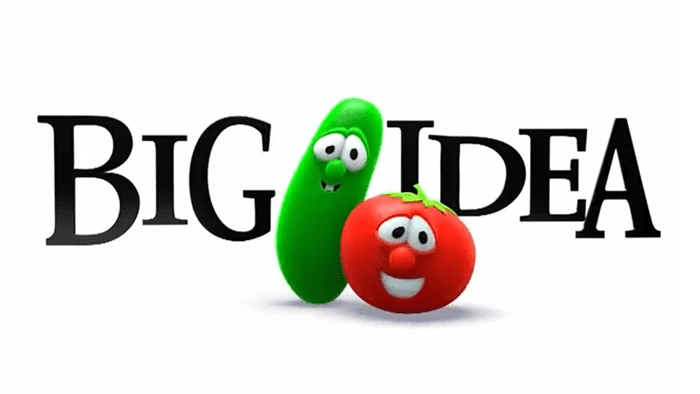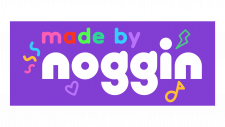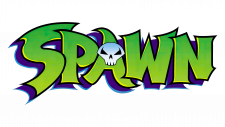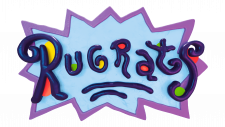Big Idea Entertainment Logo
Big Idea Entertainment is a production company known for its family-friendly content, particularly in the realm of animation. Founded in 1989, the company initially focused on creating Christian-themed stories and videos for children. Their most notable work includes the “VeggieTales” series, which features anthropomorphic vegetables in stories conveying moral and Biblical themes. Big Idea’s productions often combine humor, catchy songs, and messages about kindness and integrity, aiming to entertain and teach young audiences. Over the years, they’ve expanded their reach, continuing to produce content that resonates with families across various media platforms.
Meaning and history
Big Idea Entertainment’s story begins in 1989, initially named “GRAFx Studios” by founders Phil Vischer and Mike Nawrocki. Their first major breakthrough was the creation of “VeggieTales” in 1993, an animated series that became a cornerstone for family-oriented, Christian-themed content. This series, notable for its lively vegetables engaging in moral stories, quickly carved a niche in the market for family-friendly entertainment.
“VeggieTales” set Big Idea apart for its innovative blend of humor, music, and Christian values, presented through cutting-edge computer animation, a rarity in children’s media at the time. This blend resonated deeply with audiences, propelling Big Idea into the limelight of children’s entertainment.
However, the path wasn’t always smooth. The early 2000s saw Big Idea grappling with financial difficulties due to overambitious expansions and costly production choices. These challenges culminated in a bankruptcy declaration in 2003, marking a pivotal moment in the company’s history. Post-bankruptcy, Big Idea underwent ownership changes, eventually becoming part of the larger entities of Classic Media, DreamWorks Animation, and later Universal Pictures.
Despite these upheavals, Big Idea’s flagship series, “VeggieTales,” continued to thrive. The brand diversified into movies, books, music, and even a revamped series on Netflix, adapting to new media landscapes while maintaining its core message.
Big Idea Entertainment’s journey is a testament to innovation, resilience, and the enduring appeal of content that combines entertainment with moral education. Their story reflects the evolution of a small studio navigating the complex terrain of children’s media, and how a simple yet powerful idea can leave an indelible mark on the landscape of family entertainment.
“What is Big Idea Entertainment?
Big Idea Entertainment, initially founded as “GRAFx Studios” in 1989, is renowned for producing the beloved “VeggieTales” series. This production company specializes in crafting engaging, animated content with a focus on delivering moral and Christian values, primarily aimed at young audiences. Through its innovative storytelling and memorable characters, Big Idea has established a unique niche in the realm of family-friendly entertainment.
1989 – 1993
The logo features a striking abstract design within a square border. This geometric figure, comprised of bold, intersecting lines, conveys a sense of innovation and dynamic motion. Beneath this graphic, “GRAFx Studios” is written in a plain, sans-serif font that offers a stark, grounded counterpoint to the complexity above. The stark black-on-white color scheme enhances the logo’s boldness and ensures its adaptability across different uses. The overall design of the logo communicates a brand identity that is contemporary, creative, and forward-thinking, reflective of a studio that values both artistic expression and clarity.
1993 – 1994
Transitioning from its original design, the logo now presents the words “BIG IDEA PRODUCTIONS” in bold, capitalized lettering, conveying solidity and confidence. The typeface is clean and modern, with a uniform gray tone that offers a professional and understated aesthetic. Unlike the previous logo’s dynamic abstract shape, this design opts for straightforwardness and clarity, emphasizing the name itself as the brand’s identity. The letters are evenly spaced within a square border, reinforcing the idea of structure and balance. This change reflects an evolution towards a more direct and easily recognizable brand image, one that viewers can instantly associate with the “VeggieTales” series and the company’s broader portfolio of family-friendly entertainment.
1995 – 1996
This iteration of the logo introduces vibrant, three-dimensional characters from “VeggieTales” – a green cucumber and a red tomato, bringing life and color to the brand’s identity. The playful, animated vegetables, with their wide eyes and friendly smiles, personify the logo, a stark contrast to the previous text-only design. These characters are central to Big Idea’s storytelling ethos, and their inclusion here signifies the company’s commitment to character-driven narratives. The font of “BIG IDEA” remains bold, but it is now accompanied by a softer, more approachable feel, aligning with the company’s focus on engaging and nurturing young audiences. The copyright statement, “© 1996 Big Idea Productions, Inc.,” grounds the image with a formal touch, balancing the playful with the professional. This logo encapsulates the brand’s evolution from a simple production company to a beloved creator of animated stories with personality and heart.
1997 – 2006
In this logo, the core elements remain consistent with the previous version, yet the copyright year has advanced to 1998, indicating a progression in time. The characters, a cucumber, and a tomato, keep their position at the forefront, signifying the brand’s commitment to its roots in “VeggieTales.” The text “BIG IDEA” above the characters remains prominent, with a bold and clear typeface that asserts the company’s identity. The overall design continues to balance professionalism with the playful charm that Big Idea Productions is known for. This logo maintains a continuity that helps to reinforce brand recognition while subtly signaling its ongoing growth and presence in the industry.
1999 – Today
This updated logo retains the beloved “VeggieTales” characters, a cucumber and a tomato, yet they now appear more three-dimensional with enhanced shadowing and highlights, giving a greater sense of depth and vitality. The “BIG IDEA” text has also received a graphical uplift; it’s crisper and more pronounced, with a subtle shadow that contributes to the logo’s overall three-dimensionality. The logo now lacks the explicit copyright year present in the previous version, suggesting a move towards a more timeless brand presentation. This evolution of the logo reflects a maturation in the company’s branding strategy, aiming for a more sophisticated and modern aesthetic while still honoring the playful essence of its core characters.
2014 – 2020
In this version of the Big Idea logo, the text has been refined; the “BIG IDEA” letters appear slimmer and more elongated, contributing to a sleeker look. Notably, the registered trademark symbol now accompanies the logo, indicating the brand’s established status and legal protection. The characters, while maintaining their familiar design, are slightly resized and repositioned to interact more closely with the text, creating a cohesive and friendly image. The coloration of the characters is richer and more vibrant, enhancing their appeal and ensuring they stand out against the backdrop of the text. This logo evolution illustrates a polished and professional image while preserving the company’s connection to its original, playful roots.
2020 – Today
The latest iteration of the logo displays subtle yet meaningful refinements. The “Big Idea” font retains its slim, modern feel. The characters, a cucumber, and a tomato, have been given a more prominent position, overlapping the text slightly, which suggests a greater integration of the brand’s visual and textual elements. Their design remains largely unchanged, preserving the brand’s continuity and recognition. The trademark symbol’s absence returns a simplicity to the design, emphasizing the brand name and characters without additional legal notation. This logo maintains Big Idea’s commitment to a friendly and accessible image while streamlining design elements for a more contemporary look.


















